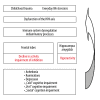The Evolutionary Theory of Depression
- PMID: 28500855
- PMCID: PMC5439380
- DOI: 10.12659/msm.901240
The Evolutionary Theory of Depression
Abstract
The evolutionary success of Homo sapiens is attributed to the following two factors: the upright body posture (which freed our hands and allowed unconstrained operation of various objects) and intensive development of the frontal lobes, mainly the Broca area of the brain. Underlining the uniqueness of the human brain, we often forget about the fact that the frontal lobes - the most developed part of the brain - are at the same time our greatest weakness, exposed to the action of damaging factors in our evolving environment. Is depression the cost of evolution?
Figures
References
-
- DiLuca M, Olesen J. The cost of brain diseases: A burden or a challenge? Neuron. 2014;82(6):1205–8. - PubMed
-
- Marcus M, Yasamy MT, Ommeren M, et al. Depression: A Global Public Health Concern. WHO; Genewa: 2012.
-
- WHO Mental Health Action Plan. WHO; Genewa: 2013.
Publication types
MeSH terms
LinkOut - more resources
Full Text Sources
Medical



